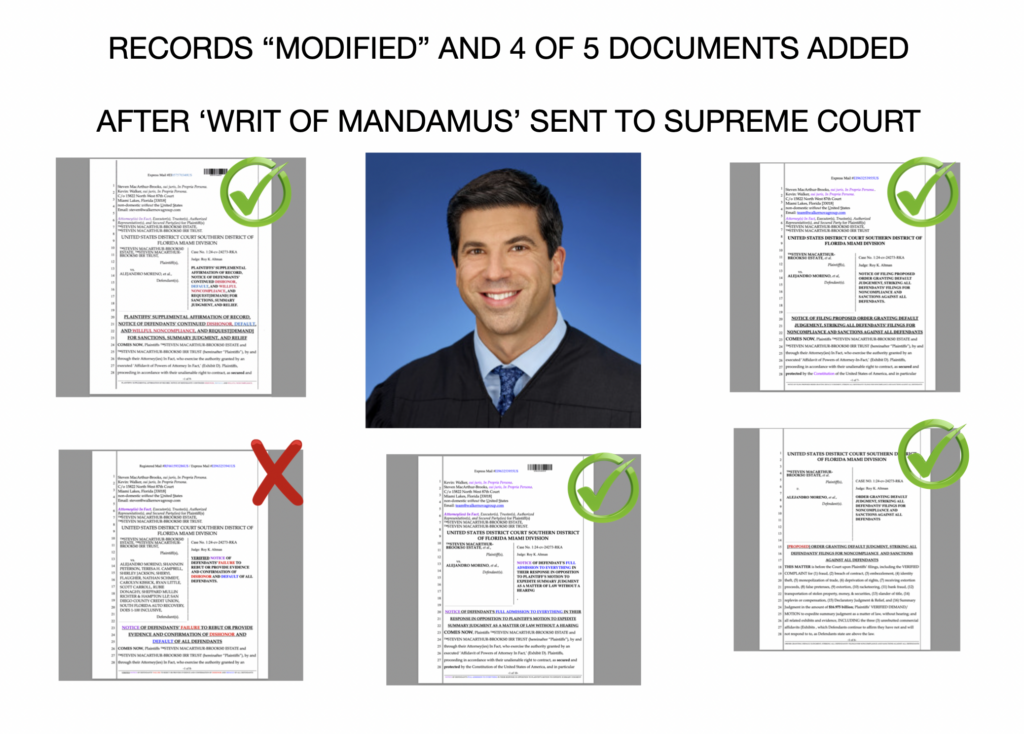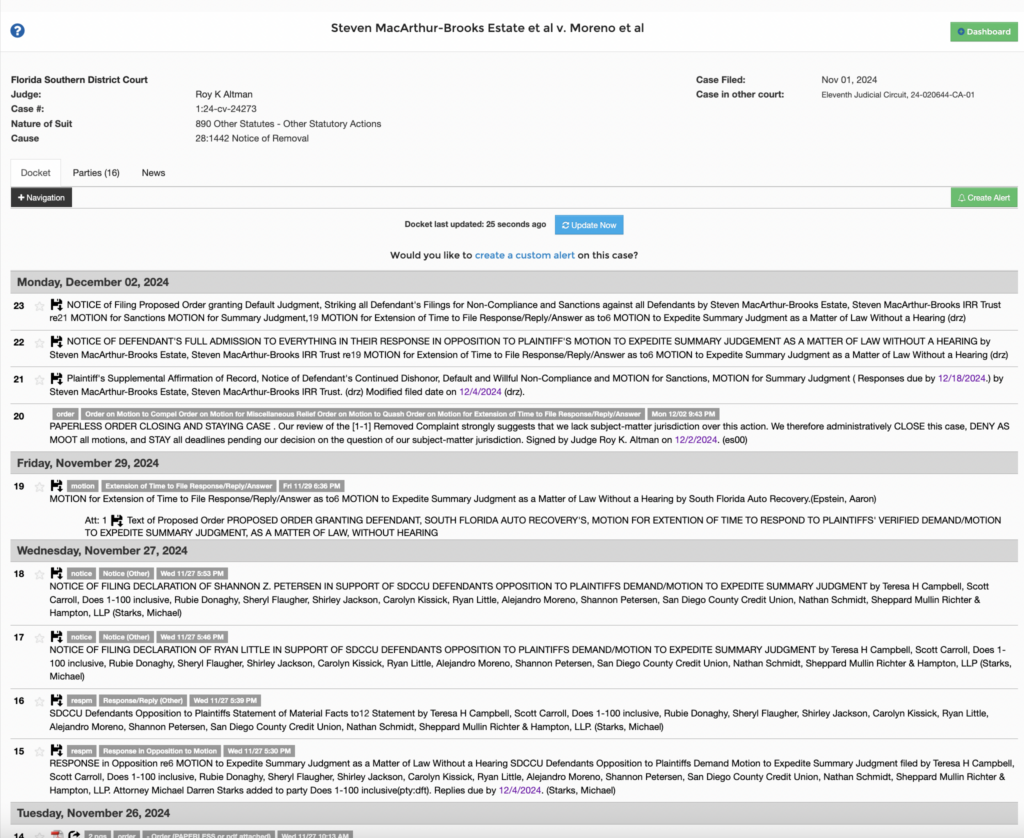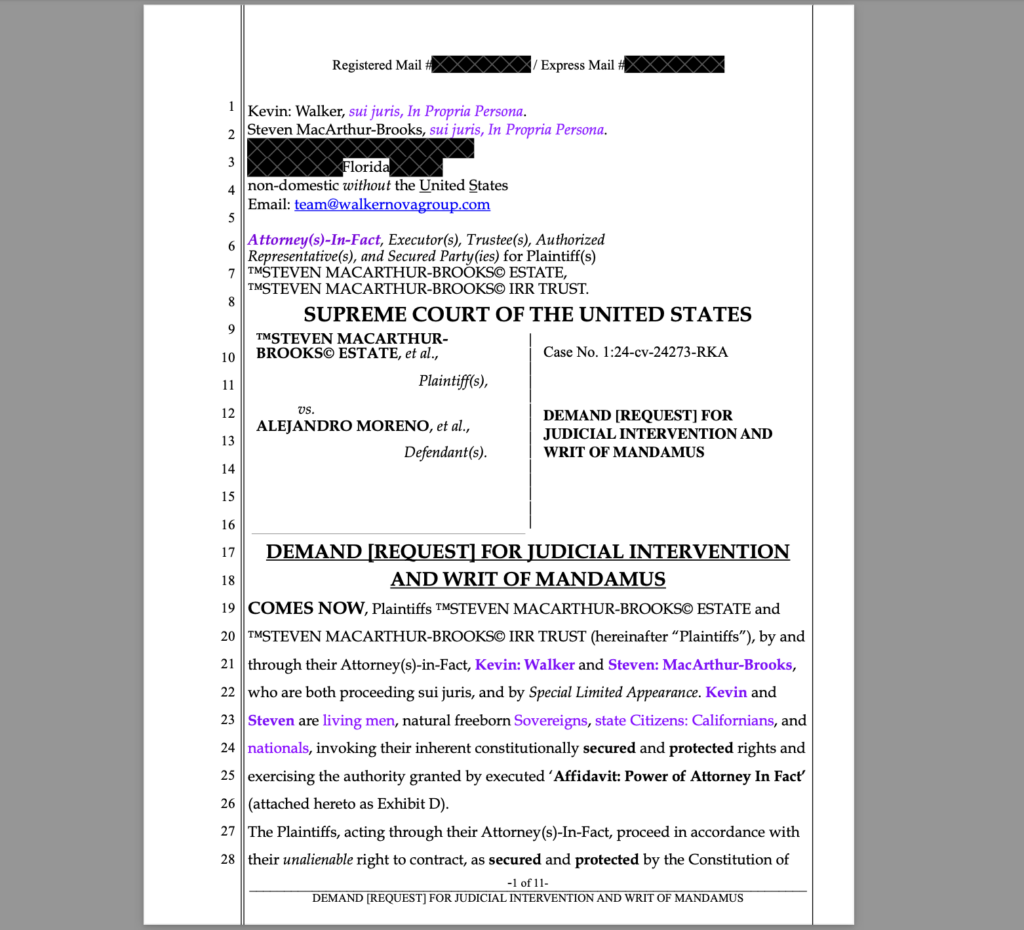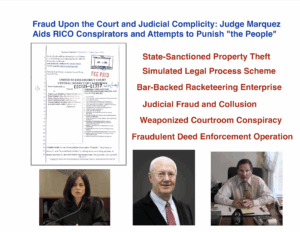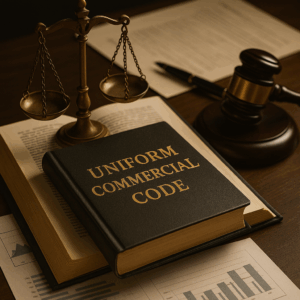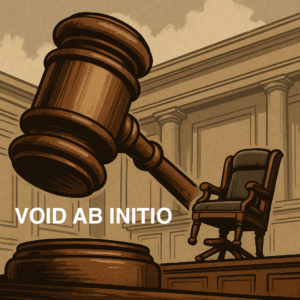In the case involving ™STEVEN MACARTHUR-BROOKS© ESTATE and ™STEVEN MACARTHUR-BROOKS© IRR TRUST Plaintiffs, acting through their Attorneys-In-Fact Kevin Walker and Steven MacArthur-Brooks, and Defendants, SDCCU and SHEPPARD MULLIN, significant developments have occurred in the wake of a Writ of Mandamus being submitted to Judge Roy K. Altman’s chambers and the Supreme Court of the United States. Several pivotal documents have been added to the official court record, underscoring the plaintiffs’ relentless efforts to re-affirm defendants’ dishonor, default, and willful and intentional non-compliance. However, one crucial document remains conspicuously absent from the record, further complicating the judicial process.
Newly Added Documents to the Court Record
The following documents were formally entered into the record after the submission of the Writ of Mandamus, signaling the plaintiffs’ continued push to finalize the matter:
1. Notice of Filing Proposed Order (Docket Entry 23)
- Title: Notice of Filing Proposed Order Granting Default Judgement, Striking All Defendants’ Filings for Non-Compliance, and Sanctions Against All Defendants.
- Purpose: This document outlines the plaintiffs’ proposed order for default judgement, emphasizing defendants’ repeated failures to comply with procedural and substantive requirements. It highlights the necessity for sanctions and the striking of all defendants’ filings due to non-compliance and dishonor.
- Relevance: By filing this notice, the plaintiffs have reinforced their position that the defendants’ actions—or lack thereof—justify the imposition of severe legal consequences under the court’s authority.
2. Notice of Full Admission by Defendants (Docket Entry 22)
- Title: Notice of Defendants’ Full Admission to Everything in Their Response in Opposition to Plaintiffs’ Motion to Expedite Summary Judegment as a Matter of Law Without a Hearing.
- Purpose: This notice serves as formal acknowledgment of the defendants’ admissions by virtue of their responses. The plaintiffs contend that the defendants, by failing to rebut or address specific points raised in the Motion to Expedite Summary Judgement, have admitted to all claims and allegations.
- Relevance: The document solidifies the plaintiffs’ assertion that the defendants’ silence or inadequate responses amount to binding admissions under legal and commercial principles.
3. Plaintiffs’ Supplemental Affirmation of Record (Docket Entry 21)
- Title: Plaintiffs’ Supplemental Affirmation of Record, Notice of Defendants’ Continued Dishonor, Default, and Willful Non-Compliance.
- Purpose: This filing highlights the ongoing dishonor and default of the defendants, documenting their continued failure to comply with procedural and legal obligations. It also includes motions for sanctions and summary judgement to address these issues decisively.
- Relevance: By supplementing the record, the plaintiffs have strengthened their case for judicial intervention, particularly in light of the defendants’ willful non-compliance and default.
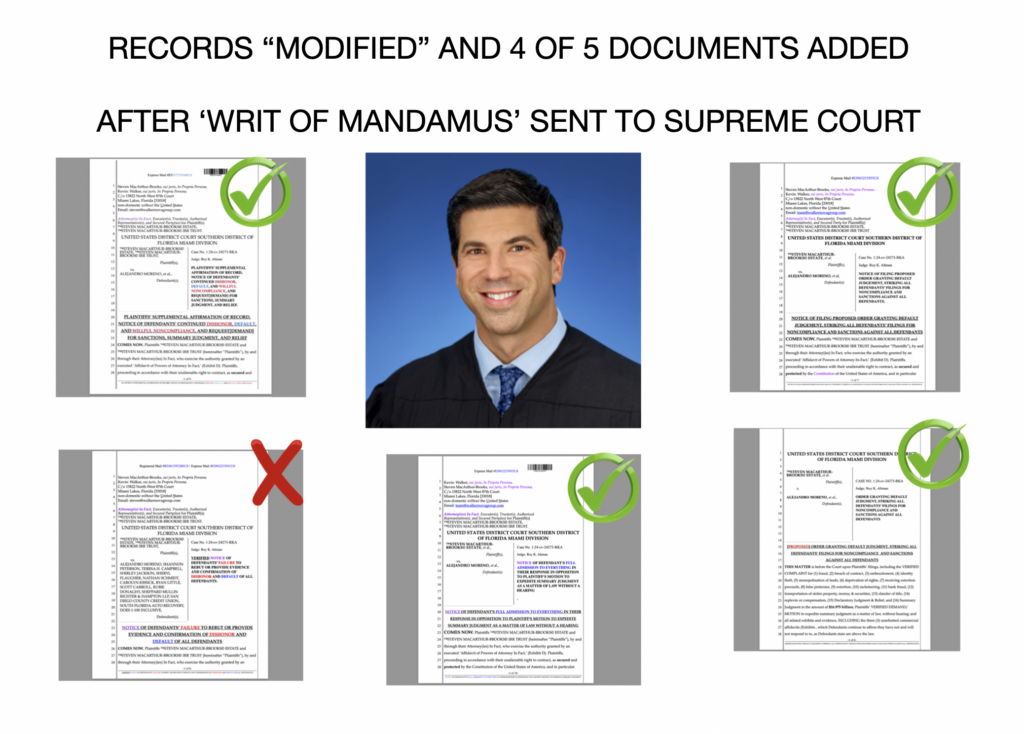
The Missing Filing: A Critical Gap
While the above documents have been successfully entered into the record, one key filing remains notably absent:
Missing Document: “Notice of Defendants’ Failure to Rebut or Provide Evidence and Confirmation of Dishonor and Default of All Defendants”
- Purpose: This document is crucial because it serves as an irrefutable affirmation of the defendants’ failure to rebut any claims or provide substantive evidence, confirming their dishonor and default under the principles of the Uniform Commercial Code (U.C.C.) and contract law.
- Relevance: Its absence from the record raises questions about procedural integrity and completeness. The document’s inclusion would serve as a cornerstone for demonstrating the binding nature of the defendants’ default, further reinforcing the plaintiffs’ claims and demands for judicial action.
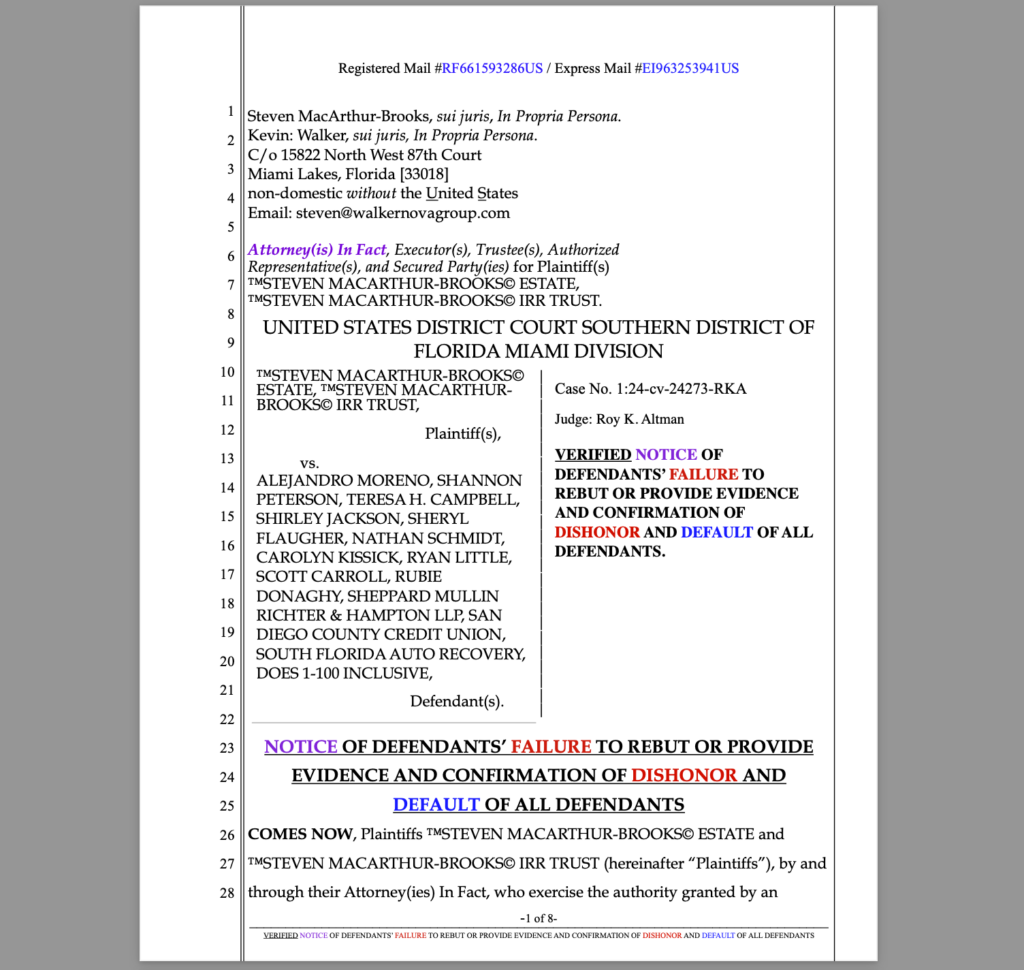
Notice of Defendants’ Failure to Rebut or Provide Evidence and Confirmation of Dishonor and Default of All Defendants
Implications of the Missing Filing
The missing Notice of Defendants’ Failure to Rebut or Provide Evidence creates a significant gap in the plaintiffs’ comprehensive presentation of the case. Without this document, the record lacks the explicit acknowledgment of the defendants’ failure to meet their obligations under commercial and procedural rules. This omission could potentially delay the resolution of the matter or create unnecessary ambiguity in interpreting the defendants’ legal standing.
Moreover, the absence of this critical filing contrasts sharply with the plaintiffs’ meticulous documentation thus far, underscoring the need for immediate corrective action to ensure the record is both complete and accurate.
Judicial Response: Mandamus and Beyond
The Writ of Mandamus filed with both Judge Roy K. Altman’s chambers and the Supreme Court seeks extraordinary relief to address the administrative closure of the case and compel the proper adjudication of the claims. The plaintiffs assert that the defendants’ dishonor and default have already been conclusively established through unrebutted affidavits and binding admissions on the record.
Further, in a recent order, Judge Altman indicated that the defendants would face sanctions and that their filings would be stricken from the record. This judicial acknowledgment of the defendants’ misconduct underscores the plaintiffs’ position that the case has already been decided in their favor based on the existing evidence and legal principles.
Conclusion: Completing the Record
The addition of critical documents to the record, coupled with the plaintiffs’ demands for judicial accountability, signals a decisive phase in this legal matter. However, the absence of the Notice of Defendants’ Failure to Rebut or Provide Evidence remains a notable gap that must be addressed to ensure the record reflects the full scope of the defendants’ default and dishonor.
As the case continues, the plaintiffs’ persistent efforts to enforce their claims and establish judicial accountability highlight the broader implications of commercial and procedural compliance in the legal system. The resolution of this matter, particularly in light of the Supreme Court’s potential involvement, could have significant ramifications for the enforcement of contractual obligations and the role of default and dishonor in judicial proceedings.

